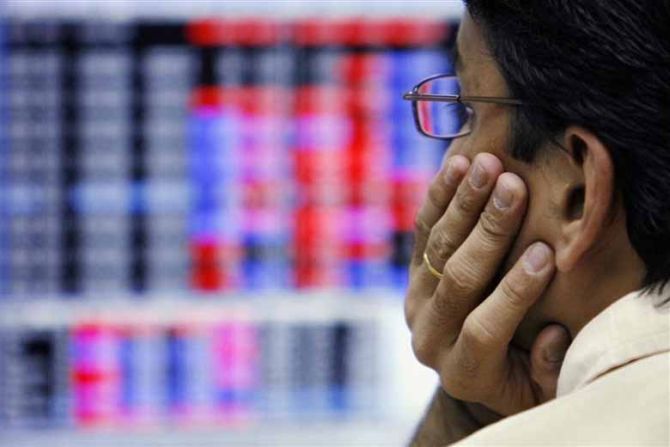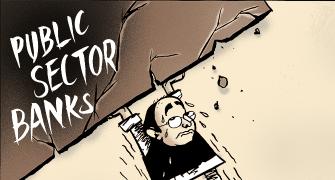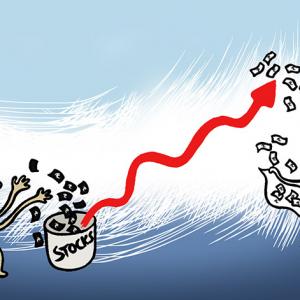'The Indian market has all the factors at the moment: Over-valuation, over-confidence, reliance on some source of massive fund flows and massive scams.'
'The trigger for a collapse could also have arrived.' warns Devangshu Datta.

Photograph: Shailesh Andrade/Reuters
During the latter stages of a bull run, just before a big crash, you'll hear many people insisting 'This time it's different'.
Those words should act like a morning alarm. They indicate an attitude of over-confidence that leads to excessive risk taking.
Investors who have received big returns over a long period tend to be over-confident. They think they will get those returns forever.
Apart from over-confidence, there are some other things that are common to late-stage bull markets.
One, extreme over-valuation across a wide variety of stocks.
Two, reliance on some source of unusually massive fund inflows.
Another factor often plays its part at these stages of the market cycle: Massive scams.
If the funds are suddenly cut off, prices collapse.
Such a cut off requires a trigger.
When there is extreme over-valuation, reliance on some massive source of funding, multiple scams, etc, the trigger will come along, sooner or later.
The trigger for such a cut-off could be some scam, or another. Or it may be political change or a war.
The Indian market has all these factors at the moment: Over-valuation, over-confidence, reliance on some source of massive fund flows and massive scams.
The trigger for a collapse could also have arrived.
Over-valuation has existed for over a year.
The major indices, the Nifty and the Sensex, are trading at the price-to-earnings ratio (PE) of 25. That's well above their long-term mean/median levels of PE 19-20.
Mid-cap indices are trading at 50-plus PE while small-cap indices are trading at near PE 100. That's extreme over-valuation.
Two sources of unusually massive funding are visible and there is another invisible source. One is household financial savings. Household savings have moved into equity over the past two years.
The other visible source is Foreign Portfolio Investments, which have been driven by several years of zero or negative interest rates for the dollar, yen and euro.
The third invisible source of funds comes from the scams.
Scams and non-performing assets (NPAs) have been showing up, one after another, like clockwork.
There is a full-blown banking crisis and it has been enabled by the weaknesses in the financial system, as the scams show.
To put it bluntly, the public sector banking system is wide open to exploitation by any unscrupulous businessman who understands its weaknesses. It's reasonable to assume that a lot of that funny money has come to equities.
Matters have reached a crisis point in the banking system. The government will be forced to try and plug those gaping leaks as it is a political embarrassment.
This could be the trigger point, and it would dry up the 'invisible' funds.
At the same time, the visible sources of overseas funds could be affected.
America's Federal Reserve is hiking rates. The European Central Bank and the Bank of Japan are very likely to start tightening up as well. That tightening could lead to a drying up of FPI inflows.
Can household savings compensate for the loss of these two sources? Chances are, retail funding will also ease off, as the scale of the banking crisis becomes apparent.
Retail investments are influenced by the wealth effect; when portfolios give good returns, households push more money into equity.
There has already been some 'negative wealth effect' with the Nifty falling by almost 10 per cent since the Budget.
The Budget also makes equity look a little less attractive with the new long-term capital gains tax.
Put it all together and we could be due for a big bear market with an index correction of 50 per cent or more.
That sort of deep correction happened in 2008-2009, 2000-2003 and in 1992-1993.
The associated reasons were the global subprime nonsense in 2007-2008, Ketan Parikh's manipulations in 2000-2003 and the Harshad Mehta scam and several others in 1992.
What's different this time? Nothing.
Household savings flowed into equity in 1991-1992, 1999-2000 and in 2007-2008. There was a contraction after the 2008 bear market knocked values down.
Institutions talked up the market until the point where they took their profits and exited.
We could have additional triggers in political uncertainty. That's guaranteed to last until the next Lok Sabha elections in April-May 2019.
Of course, we can't say if this correction would result in 50 per cent being chopped off peak prices. But it could surely happen, given the historical context.










